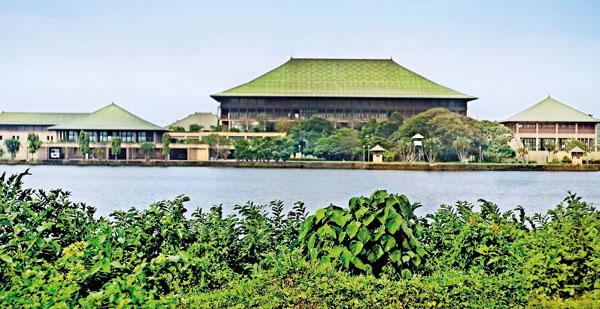 ardly a day passes without something being said in the media about the need to abolish the Executive Presidency.
ardly a day passes without something being said in the media about the need to abolish the Executive Presidency.
I am of the view that anyone is entitled to his or her own opinion on this matter. Whatever the form of government, a monopoly of power in the State would be the end of all civilized politics whether it is in the form of Presidential-Executive or Parliamentary-Executive.
Constant experience has shown us that every man/women invested with power is apt to abuse it to wield his or her authority as far as it will go. The more politicians want power the more are principles forgotten or ignored. The existence of a constitution does not mean automatically that there also exists a democratic system to go along with it.
This country had two Republican constitutions in quick succession in 1972 and 1978 and we were then told that Sovereignty was in the people and was inalienable. On the face of things everything looked normal. Now people are becoming aware that a dishonest game is being played behind the people’s back, despite all this talk about People’s Sovereignty and Democracy. Demagogy and deception by the ruling elements, over the years, have become a serious threat to social progress. At all stages of constitution-making our politicians have acted very rashly towards the people. In their opinion, constitutional issues should be of concern to the professional politicians only and the views and opinion of detached citizens are not worthwhile. They seem to think that either a Constituent Assembly or a Parliamentary Select Committee is the best forum for preparing a Constitution. After all politicians are politicians by whatever name you call them.
"Today we see the very opposite happening. Political loyalty is regarded as a very important condition for obtaining work, keeping one’s job and achieving promotion, Further, their well-being depends not on the skills of their management of public affairs and its economy, but the ability to please their superiors -- politicians and ministers"
People are merely asked to submit their proposals to the relevant Constituent Assembly or select Committee, ostensibly to show that they are being heard. Accordingly, voters should entrust a Member of Parliament with full authority and give him full scope to use it. More often than not they are intolerant of any disagreement from the voter who is very enthusiastic about constitutional reforms with the fate of the people being decided without their active participation. And the public interests are virtually ignored.
When the Soulbury Commission made its recommendations for constitutional reforms it had toured the country to gather evidence from the people. There was transparency in everything they did. That Soulbury Commission Report was a good guideline for Sir Ivor Jennings when he drafted the Ceylon Independence Act of 1947 which conferred freedom on our people. Sir Ivor Jennings unfortunately had no foreknowledge of things to come in the future. He was a man with a vision and wisdom.
Protection for the minority communities was provided for by the Soulberry Commissioners -- In the sphere of representation; in the provision for a Second Chamber; the recommendation for an Independent Public Service Commission and the Independent Judicial Service Commission and in certain reserved powers to be vested in the hands of the Governor.

In contrast to the first and second republican constitutions, the Soulberry Constitution was more in touch with the people. Under Section 14 of the Soulberry Constitution “any citizen’ could institute action against any miscreant who sits or votes in Parliament if such a person is not fit to be elected to Parliament.
Except for its few colonial vestiges, in every other respect the Soulberry Constitution was democratic and based on the rule of law which is now a dead concept in our politics. When Dr. Colvin R. De Silva drafted the first Republican Constitution he transplanted the article, into his new constitution in its entirety subject to some slight alteration. Accordingly the words ‘any citizen’ found in the Soulbury Constitution was dropped and replaced with the words ‘Attorney General’. See Article 13 of the 72 Constitution. Under the present Constitution this same law is found under Article 100. Thus the citizen is powerless, only the attorney General can initiate such action against such politicians.
"When we are reticent about certain things we cannot see the full truth. The whole truth is not palatable to some among us. At present there are no adequate constitutional safeguards to prevent such excesses"
Politicisation of the Public Service is also a malady we inherited from the days of the first Republican Constitution. This is what Article 106 of the 1972 constitution says about the Public Service administration.
“The Cabinet of Ministers shall be responsible for the appointment, transfer dismissal and disciplinary control of state officers”. With the passing of the 1972 constitution the Public Service Commission was done away with for no apparent reason. In 1978 when J.R. Jayawardene implememted his new constitution abolishing the parliamentary-executive system he did nothing to correct that constitutional defect; instead he rather preferred to create a fake public service commission and subordinated it to the cabinet of Ministers. This is what Article 59 of the present constitution says as regards public administration and state officers. “The Cabinet of Ministers shall have the power to alter, vary or rescind.
(A) Any appointment, order of transfer or dismissal or any other order relating to disciplinary matters made on appeal or otherwise by the public Service Commission or committee thereof
(B) Any order of transfer made …… etc.
In the 50s and 60s this country was blessed with clean politics free of state administration. There was a properly constituted Public Service Commission to manage our affairs with no politics in it. But with the constitutional changes effected by successive governments over the years things have turned topsy-turvy much to the dismay of the civic-conscious citizen. Today the elderly citizens of this country recollect that good old past with nostalgic memories. Under the old Soulbury Constitution neither the Governor General nor the Cabinet of Ministers could act arbitrarily ignoring the country’s basic law.
See Article 51 of the Soulbury Constitution. This is what it says: “There shall be for each Ministry a Permanent Secretary who shall be appointed by the Governor General acting on the recommendation of the Public Service Commission provided that the Governor shall communicate such recommendations to the Prime Minister and shall inform the Public Service Commission of any objection made thereto by the Prime Minister and shall not set upon the recommendation until the Public Service Commission has considered such objection and reaffirmed or varied its recommendation.”
Today we see the very opposite happening. Political loyalty is regarded as a very important condition for obtaining work, keeping one’s job and achieving promotion, Further, their well-being depends not on the skills of their management of public affairs and its economy, but the ability to please their superiors -- politicians and ministers.
Most of them are unskilled party loyalists who are prone to do any dirty work. Thus, frauds, thefts, bribe taking and corruption are rampant at all levels in the
public administration.
COPE report has exposed the corruption prevalent in state-owned ventures. But no action is taken against these culprits who rob public funds. Under the Soulbury Constitution there was no room for such corruption, as the Auditor General was empowered to deal with such matters without any outside interference by politicians. See the Article 71(1) of the Soulberry constitution.
This is what it says: The accounts of all departments of Government including the office of the Cabinet, the Clerk of the Senate, the Clerk of the House of Representatives, the Judicial Service Commission and the Public Service Commission shall be audited by the Auditor General. And again Article 71(2) says “The Auditor General shall report annually to the House of Representatives on the exercise of his function under this order.
"Except for its few colonial vestiges, in every other respect the Soulbury Constitution was democratic and based on the rule of law which is now a dead concept in our politics. When Dr. Colvin R. De Silva drafted the first Republican Constitution he transplanted the article, into his new constitution in its entirety subject to some slight alteration"
With the abolition of the Soulberry Constitution all this changed. Under the 72 Constitution the powers of the Auditor General were curbed thereby paving the way for political interference. See Article 90 (1) and 90 (5) which dealt with the functions of the Auditor General. It says the Auditor General shall also discharge such duties and functions as may be prescribed by law of the National State Assembly. And again in elaboration of that same point Article 90(5) says that the Auditor General shall report to the National State Assembly annually and as and when he deems necessary on the performance of his duties and functions under the constitution. The original mandatory character found in the Soulberry constitution was done away with under this new constitutional provision for no apparent reason.
With the abolition of the first republican constitution, things took a turn for the worse as the powers of the Auditor General were further curbed by the addition of a new sub section to Article 154 of the 78’s second Republican Constitution. See Article 154 (2) which empowers the Ministers to appoint their own auditors to audit their accounts in consultation with the Auditor General.
The COPE reports presented to Parliament had made shocking revelations about the robbing of public funds by various elements in the state sector in the name of development and there was nothing that the citizen could do to correct it. The Executive Presidency has nothing to do with it. It is fundamentally wrong to put the effect as the cause and vice versa. The cause is to be found elsewhere.
When we are reticent about certain things we cannot see the full truth. The whole truth is not palatable to some among us. At present there are no adequate constitutional safeguards to prevent such excesses. We need some direct checks and balances to be incorporated in our constitution if the citizen is to have a say on these matters. As the citizens have no control over their elected representatives, they cannot be recalled by the electors before the expiry of their term of office. Unless something is done to correct this position we cannot put an end to the blatant corruption of politicians.
 ardly a day passes without something being said in the media about the need to abolish the Executive Presidency.
ardly a day passes without something being said in the media about the need to abolish the Executive Presidency.
